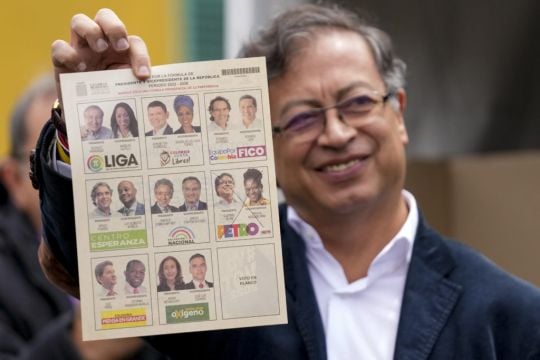The early vote count in Sunday’s six-way presidential election in Colombia pointed toward a runoff in June, with leftist former rebel Gustavo Petro leading in a ballot held amid growing discontent over increasing inequality and inflation.
Mr Petro, a senator and front-runner throughout the campaign, had just under 41% of votes and was trailed by Rodolfo Hernandez, who had 28%, with two-thirds of ballots tallied, election authorities said on Sunday evening.
Mr Petro needed 50% of the total votes to avoid a run-off election against the second-place finisher.
The anti-establishment candidate has promised to make significant adjustments to the economy, including a tax reform, and to change how Colombia fights drug cartels and other armed groups.
This was the second presidential election held since the government signed in 2016 a peace agreement with the Revolutionary Armed Forces of Colombia, known as Farc for its initials in Spanish.
But the divisive agreement was not a main issue during the campaign as challenges exacerbated by the pandemic, including poverty and inflation, garnered attention.

Candidates also focused on the increasing violence affecting the country, which the Red Cross in 2021 concluded reached its highest level in the last five years.
Although the peace agreement is under way, the territories and drug trafficking routes that the Farc once controlled are in dispute between other armed groups such as the National Liberation Army (ELN), a guerrilla founded in the 1960s, the dissidents of the Farc and the Clan del Golfo cartel.
Mr Petro and his running mate Francia Marquez upped their security significantly after they denounced threats against them.
About 10 bodyguards escorted them with shields at times.
Mr Petro’s main rival for most of the campaign had been Federico Gutierrez, a former mayor of Medellin who was backed by most of Colombia’s traditional parties and ran on a pro-business, economic growth platform.
But Mr Hernandez, a populist property tycoon, kept climbing in polls.
He has few connections to political parties and promised to reduce wasteful government spending and to offer rewards for people who report corrupt officials.







